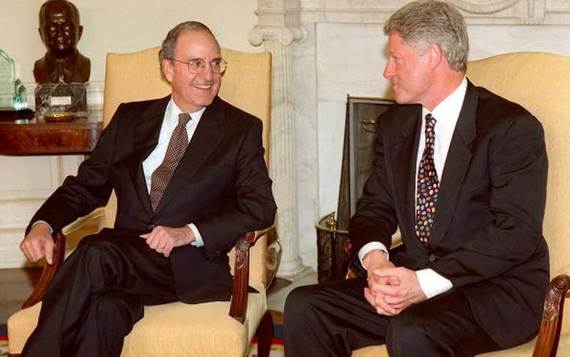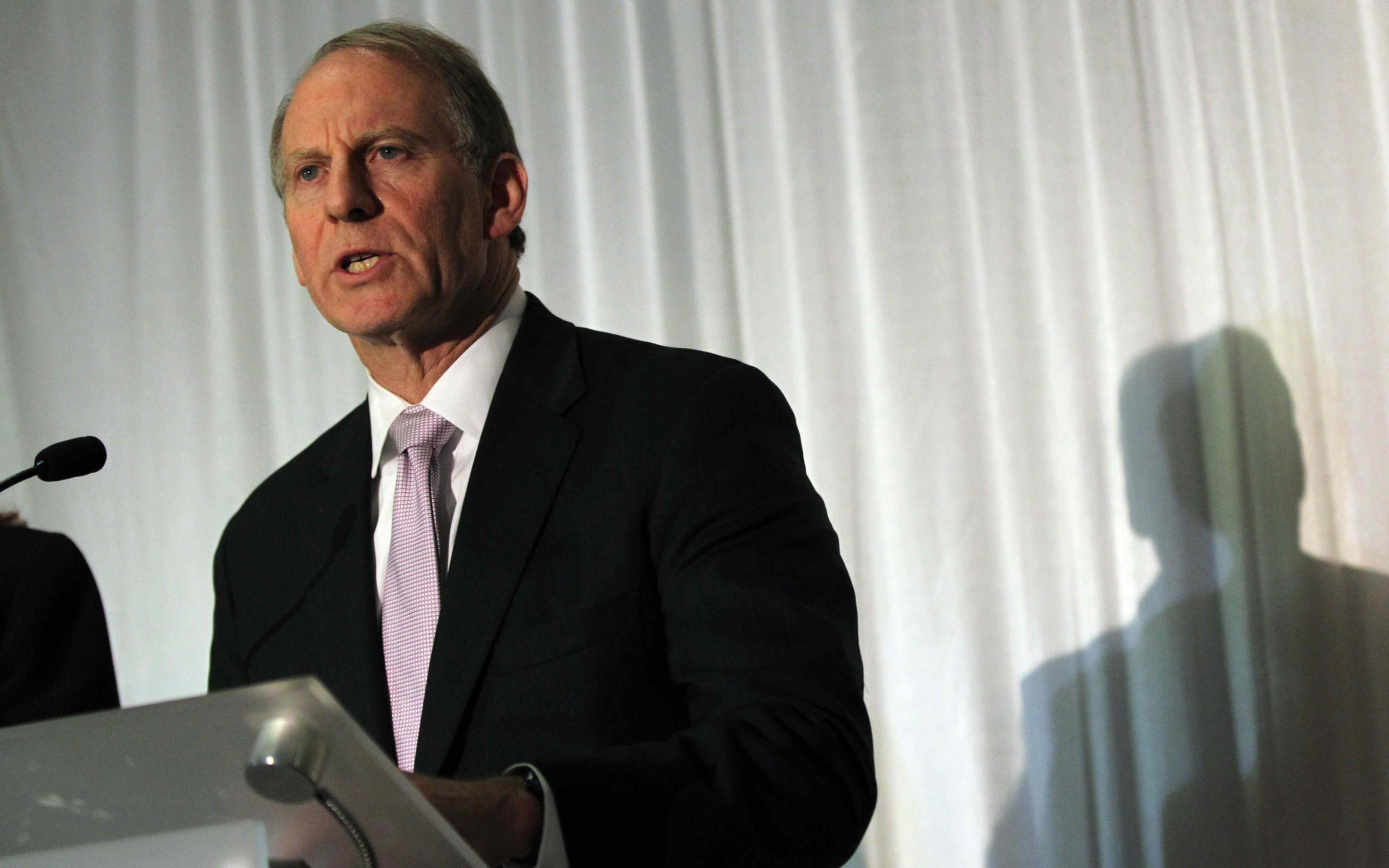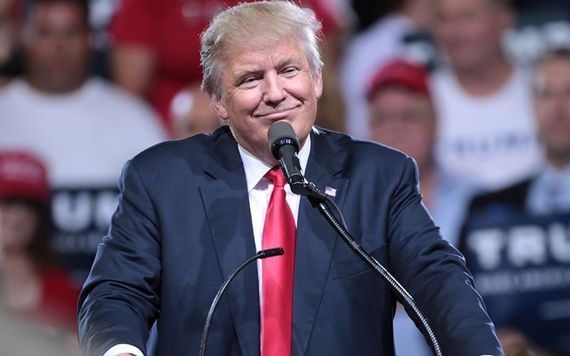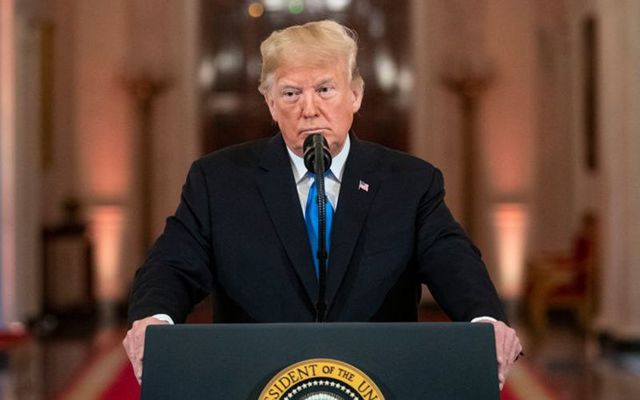Now that the midterm elections are over, President Trump should seize the opportunity for a foreign policy intervention that could prove very successful: Northern Ireland.
The reality is that President Trump can deliver a lasting peace deal in Northern Ireland. That peace would not be the cold peace we have now, with no Government in Belfast and the two sides sniping at each other over Brexit, flags and cultural identity.
Instead, it would be an actual workable peace deal that can move Northern Ireland, and indeed, all of Ireland, forward.
Now that would be a result to match anything coming out of the US midterms. After all, Donald Trump is the man who wrote “The Art of the Deal” and if ever there was a situation that required the drive and skill for a real 'deal,' it is Northern Ireland. Just ask George Mitchell, or Gary Hart, or Richard Haass, all who had steered the search for peace in Ireland. The Yanks have a long tradition here.
Read more: Yes, President Trump, words can kill, we Irish know all about it

George Mitchell and Bill Clinton.
Trump is the guy who talks tough on North Korea, but if he sees a chance to deal with them, and stop their missile building, then he goes for it. And he's right. You do the deals with your enemies, not with your friends. And you make with them deals that last.
Remember those stories about Bill Clinton getting out of bed to make phone calls to Gerry Adams and Unionist leader David Trimble telling them to stay on board for the peace process breakthrough in 1994? When it comes to Ireland, America is like the US cavalry in those old Westerns coming over the hill when all seems lost.
Well, maybe it is time it happened again. Maybe Trump and the Americans can come to the rescue of Stormont and get the two sides talking to share power and get an administration going once more?
In fact, there was a promise back in February by then-US Secretary of State Rex Tillerson that the Americans would re-appoint their Northern Ireland Special Envoy, so the will is definitely there. But Rex Tillerson has now gone and nothing has materialized on the envoy proposal. It would be worth asking why. And it would be worth urging the Americans to follow up on their proposal.
Read more: Someone should tell Trump Ireland is not in UK

Rex Tillerson
After all, the US has been successful before, and quite frankly, after last week's farce of a meeting with the British Secretary of State for the North, Karen Bradley, where the Democratic Unionist Party (DUP) and Sinn Féin could barely look at each other, it has to be worth a chance.
Especially, since Sinn Féin feel, understandably, that the UK Government is not an honest broker in the process; given Theresa May's reliance on DUP parliamentary support at Westminster.
Indeed, Karen Bradley herself conceded that there was a need for an external mediator, who could “play a constructive role,” and that the British Government was actively considering this. So step forward Mr. Trump, sir, and your special envoy!
After all, the United States has a long and very positive role in Northern Ireland, which too often goes unheralded, especially by the British (with good reason, as it shows them up). People remember Bill Clinton's role in the run-up to the IRA ceasefire of 1994 and then, with Senator George Mitchell as Special Envoy, with the Good Friday Agreement of 1998.

Martin McGuinness and Bill Clinton.
But this US role is very much a bi-partisan one and there has been an equally committed and crucial input from the US Republican party, such as with special envoy Richard Haas, who was based in Belfast and almost reached a settlement in 2013.
Plus, we also had crucial phone calls from George Bush Jr. in 2010 urging the incoming UK Premier David Cameron to show more consideration of the Irish perspective on the North. Bush repeated this line in public statements. But Cameron, who associated Bush in a partisan way with Tony Blair’s era, snubbed the US President's concerns and showed an indifference to Northern Ireland that the British would later pay for, right down to the Brexit crisis of today.
This is why we need US involvement to get the British to focus on things and energize the process. Obama retained the Irish role of Richard Haass and in recent times we even had the famous Colorado Senator Gary Hart in Belfast, trying to get the natives to hold hands. So the US Sheriff is used to trying to bring peace to this God-forsaken land!
Unfortunately, this long-running US role abruptly but predictably ended with the election of Trump as US President. Trump apparently didn't see the value or point of continuing US oversight in Ireland and he had run on a manifesto of America First. However, Trump has driven many u-turns and that isolationist intention is well gone by now.
Read more: Meet the Irish American who can demand Donald Trump’s tax returns

Former US diplomat Richard Haass speaks to the media during a press conference at the Stormont hotel in Belfast, Northern Ireland on December 31, 2013. (PETER MUHLY/AFP/Getty Images)
Former Secretary of State Rex Tillerson got this when he announced in Washington that there would be a peace envoy for Ireland. His call came after considerable pressure from a bipartisan group in Congress calling on Trump to appoint a special envoy. The Irish American lobby is still strong in Washington and especially on Capitol Hill.
And this is the thing: the US is not only an outside 'honest broker' (if leaning slightly towards the Irish side) but it also has the drive and energy necessary, and the fresh hands, to knock heads together and get a deal.
That deal can’t be impossible; the DUP and Sinn Féin have already done ten years together. The UK Government, consumed with Brexit, looks too knackered to even bother any more. And the Irish Government has lost the mojo too, it seems.
Step forward, President Trump.
For the Americans, it's win-win. There is no funding involved, or troops or drones. I often tell Americans that it's one of their few foreign policy successes in recent years and it didn't involve the firing of a single shot or rocket. So why not try it again and get Trump to send over the calvary?

Could Donald Trump be the solution for Northern Ireland?
US involvement may not provide the magic solution but it's been an often crucial involvement.
Quite simply, there would have been no IRA ceasefire in 1994, if it wasn’t for the US pressure on the UK and the guarantees given to Irish Republicans by the White House of Clinton and his officials Tony Lake and Nancy Soderberg.
But also, earlier, there might have been no Anglo Irish Agreement in 1985 was it not for the forceful US pressure on the British. This was the groundbreaking agreement which finally gave the Irish Government an institutional say in Northern Ireland.
The British Prime Minister Margaret Thatcher was reluctant to sign it. But Tip O’Neill got her buddy, President Ronald Reagan, to give her an ear bashing about Ireland, history and the need to create a shared peace.
Thatcher signed the Agreement a year later.
Sometimes the US cavalry comes late and with not many troops, but sometimes this is the very thing – when all else has been tried - that gets things over the line.
So come on, President Trump, you're following in a long tradition and this is definitely a deal that's worth fighting for.
What do you think? Let us know in the comments section, below.




Comments